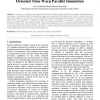Free Online Productivity Tools
i2Speak
i2Symbol
i2OCR
iTex2Img
iWeb2Print
iWeb2Shot
i2Type
iPdf2Split
iPdf2Merge
i2Bopomofo
i2Arabic
i2Style
i2Image
i2PDF
iLatex2Rtf
Sci2ools
109
click to vote
PADS
2004
ACM
2004
ACM
Time Warp -- Connection Oriented
: Time warp is a well-known optimistic mechanism for parallel execution of simulation programs. Implementing time warp using a connection-oriented communication approach is proposed in the literature as a way to improve time warp performance because it allows for the use of more efficient event queue implementations. However, no empirical performance studies have been reported for connection-oriented time warp. In this paper, we present an enhanced version of the connection-oriented time warp algorithm along with its associated data structures. An empirical performance study of the connection-oriented time warp is conducted on a network of workstations using a standard synthetic benchmark simulation model. Experimental results show that this algorithm is capable of achieving better performance than that of traditional connectionless time warp for several performance measures.
Connection-oriented Time Warp | Modelling And Simulation | PADS 2004 | Time Warp | Time Warp Performance |
Related Content
| Added | 30 Jun 2010 |
| Updated | 30 Jun 2010 |
| Type | Conference |
| Year | 2004 |
| Where | PADS |
| Authors | Nasser Kalantery |
Comments (0)

